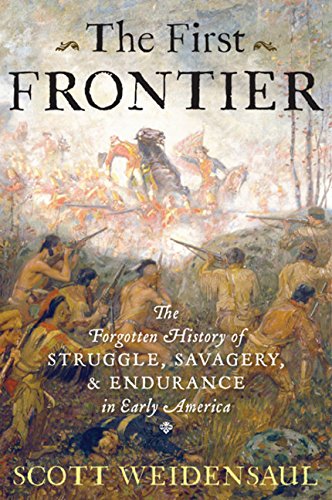 Reddit reviews The First Frontier: The Forgotten History of Struggle, Savagery, and Endurance in Early America
Reddit reviews The First Frontier: The Forgotten History of Struggle, Savagery, and Endurance in Early America
We found 3 Reddit comments about The First Frontier: The Forgotten History of Struggle, Savagery, and Endurance in Early America. Here are the top ones, ranked by their Reddit score.

Houghton Mifflin
The First Frontier: The Forgotten History of Struggle, Savagery, and Endurance in Early America is a fascinating and occasionally harrowing read. We're so often presented with the cowboys and indians history of the West that the earlier settlement of the Eastern US remains quite mysterious, especially since the landscape of the place is so urbanised now; we don't think that the quaint countryside and suburbs of Ohio or Pennsylvania were scenes of carnage not so long ago.
Here is the mobile version of your link
I'm not sure what your point here was, but I'll try to address the things that I can.
> ...you cited Amazon books, but no actual pages or paragraphs. for me to check
Copyrights, such as they are, make it impossible to link to individual pages. And, unfortunately, I don't have hard copies readily available. Amazon is the best I can provide on short notice. Scanning through their "look inside" feature I can point to to "Albion's Seed", paperback edition 1991, p. 421 - 451. While not the entirety of his writing on the subject, Fischer goes into some depth on the Quakers, their history, and impact on the Delaware valley. The "look inside" tool provided for Woodard's "American Nations" does not include a search feature so I cannot be as helpful there. Regardless, if you haven't read either of them I'd recommend both--but start with the latter as Albion's Seed is quite dry and academic; a bit of a slog tbh. The First Frontier by Scott Weidensaul is also pretty good, if you're into this constellation of historical topics.
> Seriously that Blog post is shit.
I provided it for some general context, not as a gold standard of scholarly writing. For that, you can check out the books I mentioned and delve into their respective bibliographies.
> Plus the Scots-Irish immigration was so great that Presbyterianism became the largest religious sect until the civil war. Look it up.
I don't think I need to. First, the point isn't about absolute numbers over time, it's about foundational establishment--which Quakers (and Quaker-sympathizers) certainly cornered long before the Scots-Irish. Second, correct me if I'm wrong, but it's my understanding that many/most Scots-Irish immigrants of the early colonial era went to the western frontiers in the hills and beyond (essentially modern "Pennsyltucky"). It was there they laid their own cultural foundations and spread them south. To them, E. PA and the Delaware valley was filled up with folks who they didn't get along too well with (going all the way back to their days Britain). Neither group cared much for the other and both remained aloof or antagonistic. I think it's unfair to assume that these groups averaged out. I mean, that's sorta my point here--you can still see the lines in modern voting maps.
> When Penn's sons, who disavowed quakerism, took control, influence dried up.
Perhaps we differ on what we mean by "influence". Penn's sons didn't erase every law in the book or purge community leaders and re-educate all the children. Quaker-inspired ideas were already rooted and integrated into the fabric of the society, even in non-Quaker houses. That's not to say it was 1-directional, but my point was that they had a significant influence, and patterns of life and culture are notoriously sticky (in the absence of genocide). Perhaps their direct political influence was curtailed, but the long slow background radiation persisted, and (I think) still does.